Businesses operate on dozens of workflows and processes at any given time, but how many of those business processes are documented, standardized, stored, and shared in a way that benefits all business users? Business process management (BPM) is a business strategy that focuses on managing these processes through defined workflows, automation, and increased communication and transparency. In many cases, BPM software is used to optimize how a business operates across different departments and initiatives. Read on to learn more about what to expect from your BPM solutions and what top BPM tools are leading the market today.
Also Read: Top 8 Data & Data Analytics Trends for 2022
Selecting the Right BPM Solutions for Your Business
- What is a Business Process Management Tool?
- Features of BPM Tools
- Best BPM Tools for Enterprise
- Who Needs BPM Solutions?
- What are the Benefits of a BPM Tool?
What is a Business Process Management Tool?
A business process management tool can support BPM best practices by automating, standardizing, and creating more visibility for business processes across an organization. It’s not focused on IT or non-IT teams exclusively; any team can benefit from these tools, and they’re often used to streamline interdepartmental workflow management.
Features of BPM Tools
BPM tools provide a variety of features to increase productivity and efficiency across business operations. Here are some of the top features that you should look for in a BPM solution:
- Data mapping and process visualization: One of the greatest benefits of BPM software is the ability to dashboard, graph, map, and visualize data in workflows. It helps users see how their projects connect and find the right people to collaborate with on different tasks.
- Business process automation and workflow management: Many BPM solutions offer workflow management and workflow automation. So once a process is in place, your team can turn on automation and receive assignments and updates automatically.
- Templates: Whether it’s for an org chart, a DevOps workflow, or something else entirely, many BPM platforms extend ready-made templates to their customers to assist with process standardization.
- Regulatory compliance: Many BPM vendors recognize the importance of compliance for their customers and now offer different risk assessment and management tools, as well as additional security features to keep up with regulations.
- Performance dashboards and analytics: Most BPM solutions offer dashboarding and customizable reports, helping teams to understand how they’re tracking toward their business goals. These features help administrators track performance and other employees understand how their work contributes to greater goals.
- Low-code/no-code: Business operations teams frequently want tools that make it easy to create and manage workflows. That’s why many BPM vendors are set up to offer low-code/no-code solutions for their customers.
- Collaboration tools: Many projects can’t progress unless different employees and departments know what others are working on. Collaboration tools allow teams to view activity across projects and to comment on, assign, and manage tasks as they relate to other team members.
More on enterprise communication and collaboration: 7 Trends in Enterprise Unified Communications & Collaboration (UCC)
Best BPM Tools for Enterprise
Pipefy
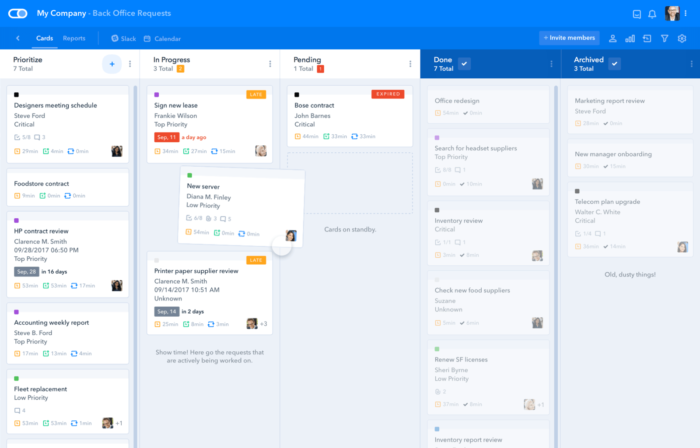
Pipefy is a top business process management tool that focuses heavily on accessibility through workflow visualizations. The system is set up with “pipes” that connect workflows and tasks, and these pipes can be reconnected and reconfigured with a simple drag-and-drop. The platform also emphasizes accessibility for the customer service and user experience through the Request Tracker feature, which simplifies the process for tracking the status of various tickets, projects, and subtasks.
Pipefy offers a variety of robust features to its customers, but they also provide a free version of the tool with basic functionality. This can be a great solution for a team that wants to first get comfortable with the product, a smaller team that needs only a few Pipefy features, or even a single user who wants a better tool for managing their own tasks and project progress.
Features:
- External file reception and processing through Phase Forms feature
- Status request tracking for customers, employees, and vendors through Request Tracker feature
- Centralized request form repository through Pipefy Portals
- Automated email and ticket management
- Approval flows with customizable pipe connections
Pro: This tool is a strong option for companies that need many clear avenues of communication across internal users, customers, and vendors.
Con: Some customers have had trouble with systems notifications, particularly after recent updates.
Pricing: Pipefy offers starter, business, enterprise, and unlimited plans. Learn more about pricing here.
Kissflow
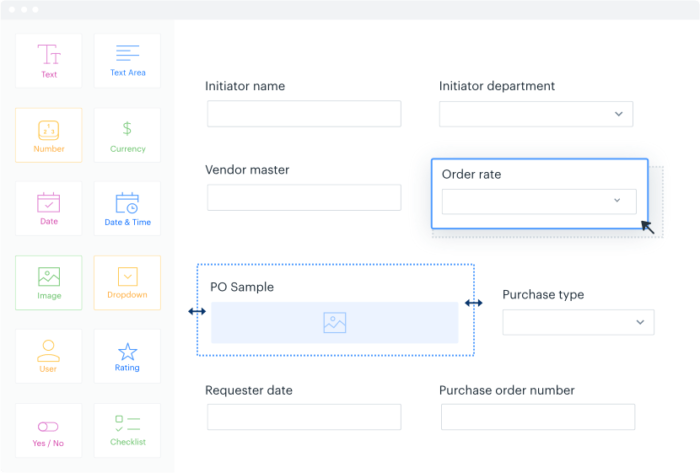
Kissflow is a strong BPM software option for companies that require collaborative and agile features as a part of their process management. With dynamic role and task management, team-based assignments, and mobile access, many teams select this tool to build and store effective processes for DevOps teams.
Kissflow also focuses on creating forms that make internal and external processes simpler to manage. They offer several different templates and forms to meet different business needs, including IT and incident change management, sales pipelines and quoting, and travel and health status tracking.
Features:
- Forms with 20 field types, advanced formulas, and drag-and-drop layouts
- Public forms for data collection from external users
- Workflow settings include steps and assignment, deadline setting, conditions management, and parallel workflow branches
- Administrative management of workflows and tasks through field visibility management, workflow previews, and test data runs
- Process auditing capabilities with real-time access to digital paper trails
Pro: This tool offers many agile-specific functionalities, including dynamic routing based on SOPs, dynamic business rules and assignments, and deployment-focused features.
Con: Some customers have had difficulty managing purchase orders in this system.
Pricing: Basic, advanced, fully loaded, and enterprise payment plans are all available. Learn more about Kissflow pricing here.
monday.com
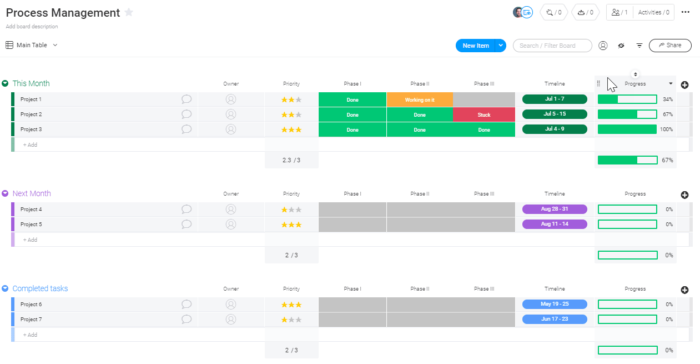
monday.com is robust project management software that spans many different business functionalities beyond BPM. Some of the core use cases for the platform include ticketing management, customer relationship management (CRM), and sprint or agile project planning. For business process management specifically, customers often choose monday.com for its expansive dashboards and customizable features.
A customer favorite on this platform is the recipe automation feature. monday.com offers precoded automation to their customers for everything from automated Slack notifications to status updates and project archiving to task assignments to certain users based on task type. The recipes feature can be set up for different time periods and triggers, and users can even set up multi-step automation for more complex process needs.
Features:
- Ready-made apps and integrations in the apps marketplace
- Several options for dashboard and individual task management views
- Automation and checklist recipes for workflows
- Integrations with several communication and collaboration tools, such as Slack and Google Suite
- Templates available for different types of projects and departmental goals
Pro: monday.com offers a robust library of preset automations, called recipes.
Con: Depending on the number of seats and features your team needs, monday.com can become very costly.
Pricing: Pricing depends on monthly or annual payments, and comes in five different plan options: individual, basic, standard, pro, and enterprise. Learn more about pricing here.
Process Street
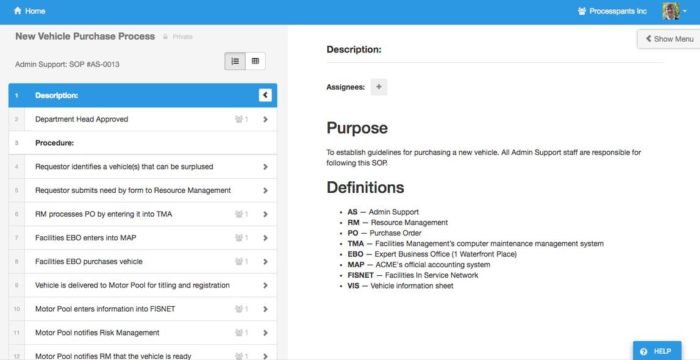
Process Street is a no-code BPM software solution that boasts a roster of several top enterprise customers. The platform is known for offering straightforward process management solutions through an intuitive user interface, making it possible for non-technical teams to use this tool effectively.
Process Street offers its customers specialized help and prefigured solutions for a variety of use cases. Some of the most common business processes and use cases that they support include new client setup, employee onboarding, Git workflows, procurement, IT help desk support, project management, reporting, candidate screening, invoice generation, and internal auditing.
Features:
- Conditional logic and templating for agile workflows
- BPM dashboard with a reporting API
- Zapier, webhooks, and APIs available for third-party integrations
- Task assignment and procedure documents for key decision-makers
- 10+ form fields with drag-and-drop functionality
Pro: Process Street’s activity feed offers a clear, actionable user interface for different employees to check progress at a glance.
Con: Process Street offers slightly fewer form customizations than some of its competitors.
Pricing: The pro package is $25 per full user per month. Custom enterprise pricing and free trials are also available. Learn more about pricing here.
iGrafx Business Transformation Platform
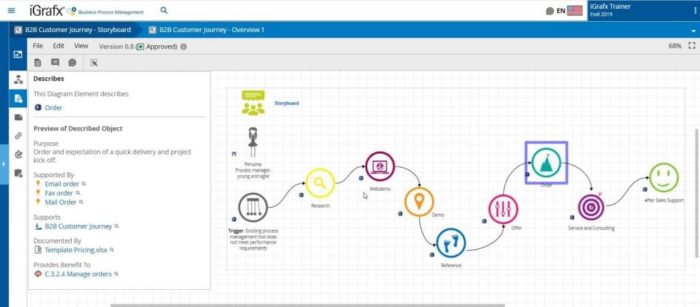
iGrafx Business Transformation Platform is a top BPM tool that gives its customers several avenues for customer support. Some of its top support resources include online articles and blogs, case studies and customer reviews, infographics and whitepapers, and videos and webinars.
The company also emphasizes transparency by providing prospective customers with assistive data in their BPM platform search. iGrafx extends a resource called the Scorecard / RFP Tool, which gives prospects free access to tools like vendor scorecards and guiding RFP questions, helping customers to find the right tool for them.
Features:
- Process modeling, discovery and optimization, and knowledge management
- Features for process compliance, risk management, and GRC, particularly through risk mining
- Customer journey connections to systems and processes
- iGrafx Quick-Mapper for process capture and workflow management
- Process Designer feature for diagramming, SOPs, and process narrative reporting
Pro: iGrafx offers several strong business continuity and data protection features for customer security and compliance.
Con: Some users find the user interface difficult, specifically when using drag-and-drop features on charts.
Pricing: Pricing is available by request from the iGrafx team. A free trial is available.
Kintone
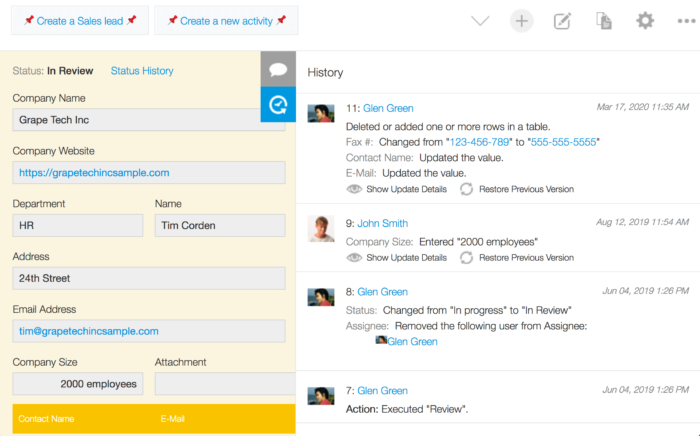
Kintone is a smaller solution in the BPM market that focuses heavily on custom business application creation and standardizing the processes for those apps. It has the potential to be a strong solution for smaller companies with well-integrated teams because the platform emphasizes fewer panes of glass for dashboarding and reporting. HR, marketing, sales, operations, and other teams that work together can easily see how their work contributes to bigger projects with this tool.
Features:
- Custom business application creation
- Single centralized dashboard for business metrics
- In-database collaboration with threads, in-record comments, user profile walls, and private messages
- Integrations available through REST APIs and extensions
- Custom conditional workflows with task assignment and notification capabilities
Pro: This solution offers a single customizable dashboard approach, so users can see how all company data, including HR and CRM-style data, connect to other business processes.
Con: The singular dashboard approach is not a great fit for all companies. Larger businesses might want to separate different business processes and integrate those separate dashboards for simpler data visualization.
Pricing: Kintone offers several different pricing plans, including one for specialized governmental or educational uses. Learn more about pricing here.
Zoho Creator
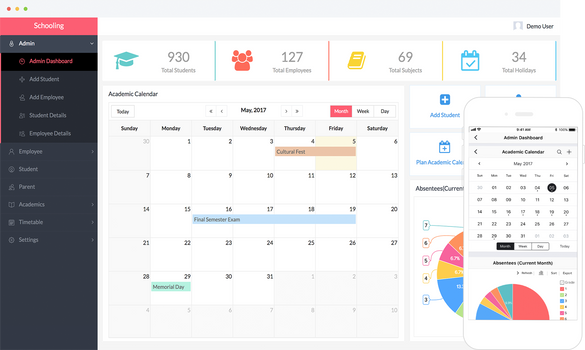
Zoho Creator is another BPM platform that stresses ease-of-use for application development and workflow building. Zoho’s BPM solution is one of the top ones in the market for data security and governance in particular. The platform provides security and administrative management features like end-to-end protocols, GDPR and HIPAA compliance guidance, an OWASP-based security framework, content encryption, data erasure, and IP restrictions.
Features:
- Script builder with drag-and-drop code snippets for workflow building
- Mobile-specific features include push notifications, geo-fencing, and QR/barcode scanning
- Apps run natively on PCs, tablets, iOS, and Android mobile devices.
- Source data from different locations to create cross-functional reports
- Personalized brand experiences with white-labeling and auto-translation
Pro: The Smart Import tool makes it easy to migrate legacy data sets and get them organized in the system.
Con: Some users think that the search feature is difficult to operate.
Pricing: The professional package is $25 per user per month, and ultimate is $400 per month billed annually. Learn more here.
Creatio Studio
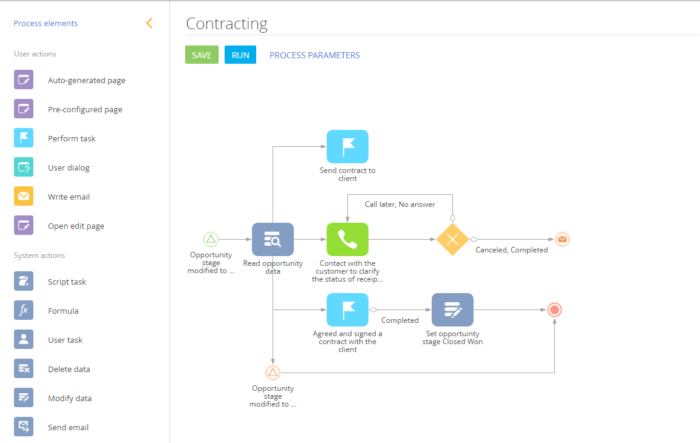
Creatio Studio makes it possible for BPM users to build templated or more customized processes through their no-code approach. The platform’s Case Designer is a major selling point for this tool, giving users the ability to build unstructured process cases, map workflow stages with their own stage conditions, and follow prompted steps to effectively close and save a completed process for future reference.
Features:
- Identity and access control tools
- Integration available through .Net tools, REST, SOAP, OData, and open API
- Out-of-the-box templates available for application development
- Artificial intelligence model training for automation in workflows
- Unstructured process building through no-code Case Designer
Pro: Creatio offers interactive prompts and dialogues to administrators and users, giving suggested next steps in a process.
Con: Creatio offers limited messaging and external communication features for customer service needs.
Pricing: Creatio Studio comes in free and enterprise versions. Studio enterprise is $25 per user per month. Learn more about pricing here.
Also read: The Rise of Rich Communications: What Does it Mean for Enterprises?
Who Needs BPM Solutions?
Businesses of all different sizes and backgrounds can benefit from BPM solutions, but businesses in these situations are likely to yield the most ROI:
- Your company has gone through a merger or acquisition (M&A) and needs to standardize processes across new employees and lines of business.
- You heavily rely on ITOps, DevOps, and other operational teams in your organization.
- Cross-departmental projects are a normal part of your operations.
- Your team needs compliant and secure ways to store and manage process data.
Learn more about process and project management from Project-Management.com: Best Project Management Software for 2022
What are the Benefits of a BPM Tool?
Workplace process visibility
With features like dashboards, graphs, activity feeds, and commenting, BPM platforms help with workplace process visibility for both administrators and employees. Different users can use this tool to quickly visualize bottlenecks and execute on or assign needed improvements for a project.
Regulatory compliance management
Especially for companies that work with a large amount of sensitive and customer-facing data, it’s crucial that processes comply with regulatory laws for using this kind of data. Many BPM tools offer native GRC and security features that are based on the most common data privacy and compliance standards.
Learn more about networking and compliance: Five Tips for Managing Compliance on Enterprise Networks
Process standardization and logic building
BPM primarily focuses on standardizing operational processes, and it often does this through logic building. Many tools offer if/then logic building and logic suggestions for users, making it easier for them to build and round out processes for a team.
Process management across departments and users
Different departments and users don’t always have the same level of access and understanding of company projects. With BPM process management software, you can add all relevant users and give them exactly the amount of information and visibility they need to work with other employees and departments.
Supporting tool for DevOps, AIOps, and collaborative teams
DevOps, AIOps, ITOps, and other operational teams need effective ways to streamline processes and track progress across subtasks and users. BPM tools make it possible not only to track how a project is going but to standardize and refer back to historical projects in the future.
Read Next: Best DevOps Tools & Software of 2021
The post Top BPM Tools 2022: Business Process Management Software appeared first on Enterprise Networking Planet.

